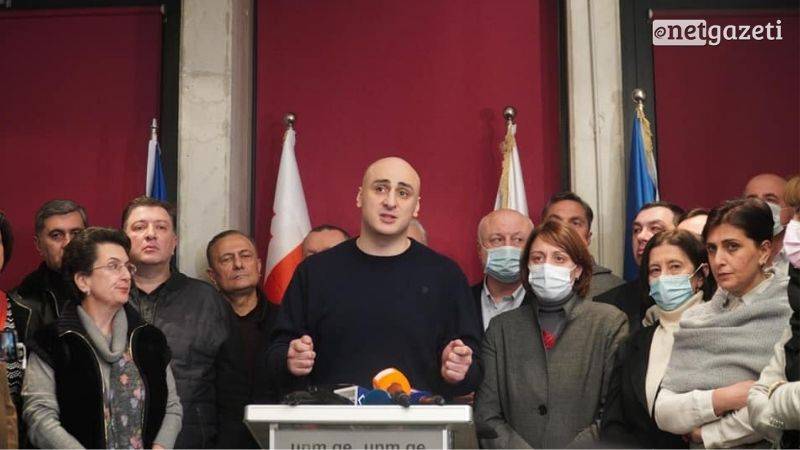საერთო ცხელი ხაზი +995 577 07 05 63


Photo: Netgazeti
GYLA and EMC assess the imposition of remand detention to Nika Melia critically and believe that this decision shows signs of selective, political justice. The organizations call on political leaders to take constructive steps to bring the country out of the political crisis and to avoid polarizing the society, further radicalizing the situation and shifting it to a violent mode.
As it is known to the public, on February 17, the Tbilisi City Court sentenced Nika Melia remand detention for attempting to break into/invade the Parliament building on June 20-21 (for leading and participating in group violence). The main argument for the application of detention was Melia's disobedience to the terms of the measure of restraint previously imposed on him and the non-payment of increased bail, which could jeopardize the efficient administration of justice on the case.
It is noteworthy that during the events of June 20-21, the state used police force of unprecedented scale in recent years, which resulted in 275 people receiving various types of health injuries, including 187 civilians and up to 40 journalists. Dozens of police officers also suffered injuries. Due to the injuries sustained, surgery was required for 28 individuals. It has also been confirmed that as a result of the trauma caused by the rubber bullet fired by the police, two demonstrators lost one of their eyes, several of the victims suffered significant damage to their eyesight.
Unfortunately, the events of June 20-21 have not yet been effectively investigated by the state and the responsibility of law enforcement, including senior officials, for the use of disproportionate, unjustified force against protesters has not been established. Nearly 20 months after these events, it is still unclear who made the decisions to manage police units and carry out specific coercive measures. According to the information provided by the Prosecutor's Office, criminal proceedings have been launched against only 3 employees of the Ministry of Internal Affairs within the framework of the ongoing investigation. Unfortunately, up to now, the Office of the Prosecutor has not granted the status of a victim to most of the injured without any substantiation. Among them, out of 27 victims under the protection of GYLA (11 of them are journalists), only 3 have been granted the status so far.
The chronology of the current case against Nika Melia and the developments show that the decisions in the case are made based on political expediency, which is another attempt to use the Prosecutor's Office and the justice system for political purposes.
Questions also arise about whether the application of imprisonment as a measure of restraint against him was substantiated in general. At the trial on 17 February, the prosecutor's main argument in the case as to why imprisonment should be applied to the defendant was Nika Melia's demonstrative disobedience to the terms of the measure of restraint previously imposed on him. However, the prosecutor did not present any concrete evidence that would satisfy the preconditions for the use of imprisonment under Georgian law. In particular, the prosecutor has not shown that
Violation of the terms of bail as a measure of restraint is the basis for the current legislation to replace it with a more severe measure of restraint, but the use of a measure of imprisonment, which is a serious and the last resort mechanism of interference with human rights, requires its constitutional justification and careful scrutiny of its legitimate goals and conditions. Without proper grounds existing, the mere violation of bail terms cannot become a precondition for the application of imprisonment. Given the context of the case and the figure of the accused, as well as the fact that almost 20 months have passed since the start of the investigation and we do not have the legal grounds mentioned above, the court judgment on the application of imprisonment seems unfounded.
As for the political side of the case - unfortunately, the case once again shows the inability of the leading political forces to create a democratic, constructive dialogue. Even after the parliamentary elections carried out with irregularities, the government did not find the political will to alleviate the existing political discontent and polarization and offer an effective plan for distributing power to the political opposition and democratic reforms to the public. Moreover, in the last phase of the ongoing political negotiations mediated by international actors, the government has resumed ongoing investigations against the political opposition and other related figures. The path of boycott chosen by the opposition parties in the process, including the political disobedience of Nika Melia, also contributed to the radicalization of the political environment. In this case, too, the Georgian Dream has failed to create expectations and guarantees that the situation is defused through constitutional-political means and continues to use law enforcement and punitive leverage as its only political instrument. The use of the police/Prosecutor's Office and the judiciary by the authorities as a weapon/instrument in response to political crises shows the dire consequences of politicizing these institutions and reveals the government's inability to overcome the challenges facing the country through political dialogue. The ongoing political crisis leaves no room for discussion about the severe economic and social challenges facing our country, which further alienates the policy's content from the essential needs of society.
In light of all the above, the signatory organizations call on:
To the Government of Georgia:
Political parties:
Law enforcement agencies:
The website accessibility instruction